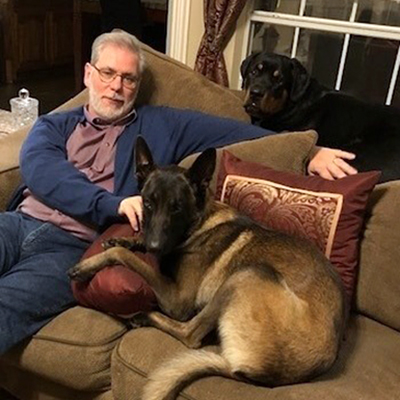 Menu
Menu

“I know they can’t understand me,” he clarified. “I’m not crazy — though some of my neighbors probably think I am!”
The dogs’ companionship does indeed appear to help fuel Easttom’s passion for learning and teaching, so “research team” seems an apt description.
Research has driven his life and career, because it is simply something he loves. He considers all of his work — whether teaching, writing, consulting or serving as an expert witness on patent and cybersecurity court cases — part of the same thing: learning and then conveying what he’s learned to someone else in an understandable way.
“When I’m learning something, I get excited, and when I explain it to someone else, I get excited again,” he said.
The 22 patents he holds came out of his penchant for “digging deeply” into topics and problems.
Easttom received his first patent in 2013 for developing a method, called “distributed steganography,” of hiding data in images or other types of files. This method enabled the distribution of content across multiple different files in different locations and was meant explicitly for police officers and intelligence agents working undercover, when they needed to communicate large quantities of information in a way that couldn’t be detected.
The three recent patents that brought his total to 22 all deal with the preservation, protection or tracking of data on some level:
Patent No. 10,708,118 — Managing a network element operating on a network: This patent is concerned with expanding on the SNMP protocol to not only manage network elements, but to take corrective action.
Patent No. 10,635,815 — Method and apparatus of performing data executable integrity verification: The concept for this invention is to check the validity of executables and libraries every time they are executed. This allows for the detection of Trojan horses.
Patent No. 10,621,149 — Stable File System: File systems such as NTFS, EXT, etc. organized files on a drive. This invention is about enhancing file systems with structures that allow for the prevention of lost file segments (i.e. clusters) using data structures such as doubly linked lists.
“Some might say I’m a workaholic or that I have OCD,” he said. “I’m always doing something, researching new things. Sometimes it becomes a research paper, sometimes a patent. I just finished my 31st book. It’s just what I love to do; while other people are out playing golf, I’m learning things. It’s not something I set out to do; I just keep digging into things, many of which don’t work out, but some do.”
UD was already using Easttom’s textbook on digital forensics when Associate Professor of Cybersecurity Sandra Blanke, Ph.D., reached out to him to see if he would be interested in designing a course around the book; designing the course evolved into him teaching it for a couple of semesters as well. Though he lives locally, he taught online, because his travel schedule would have precluded him being present for many of the classes.
“The Gupta College of Business works diligently to attract and engage highly qualified academic professors with corporate and/or governmental experience in cybersecurity,” said Blanke. “Dr. Easttom is well known in the cybersecurity field and specializes in topics including quantum computing and digital forensics. His experience in these highly sought-after topics is extremely valuable to our graduate cyber students and our Cybersecurity Master of Science program.”
“I’ve been working for myself for about 16 years,” said Easttom. “I consult in artificial intelligence and cybersecurity, and I’m also frequently called to serve as an expert witness in court cases that are patent- or cybersecurity-related."
He explained that his expert categorization probably results from a combination of his books and his patents.
“Attorneys look for those with deep expertise,” he said. “They also like to use those who’ve done it before and won’t crack under pressure.”
Back at home, Easttom admits that, because their children are grown, the dogs are a little pampered by him and his wife — from their “research team” walks to home-cooked meals, 8 p.m. snacks and, for the Rottweiler, watching his favorite T.V. shows and movies (he prefers mysteries and sci fi action). It works well for Easttom that the dogs incorporate themselves so well with his other pursuits, because he doesn’t really ever plan to retire; why would he, when he loves his work so much?
As he tells his students, “The secret is to really enjoy what you do so you’re not counting the days to retirement. I don’t see myself ever actually retiring (though I might reduce my schedule).
“You have to stretch,” he added. “I look at learning the same way others might look at going to the gym. If you leave a class and your head is mildly aching, that’s how it should be; learning should make your head ache a little. If it’s too easy, you’re in the wrong class. For you to pay tuition and not have your mind stretched is a little like going to an expensive restaurant and not finishing your meal.”